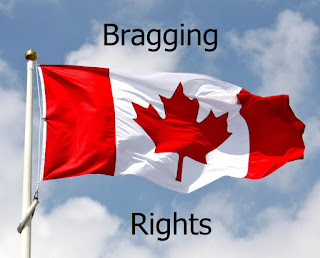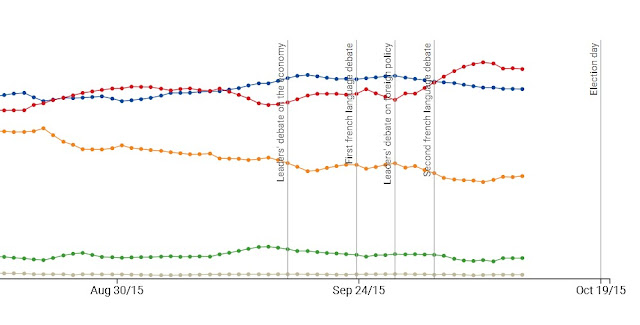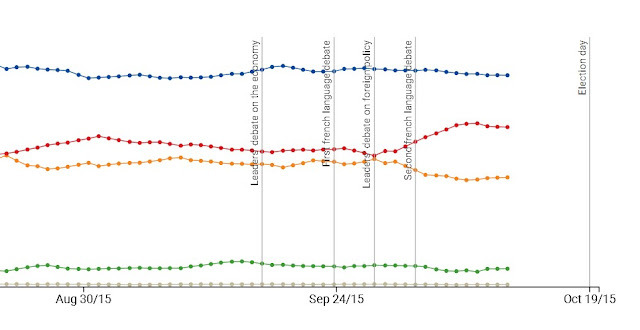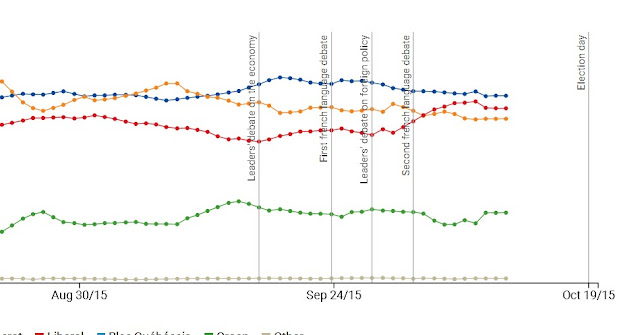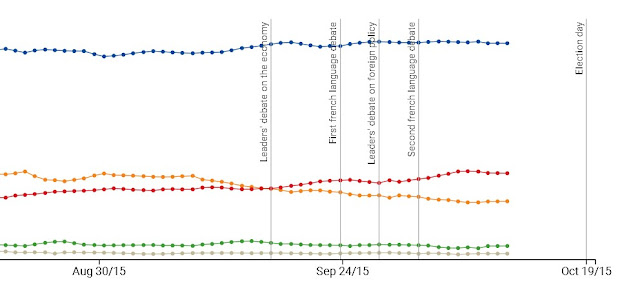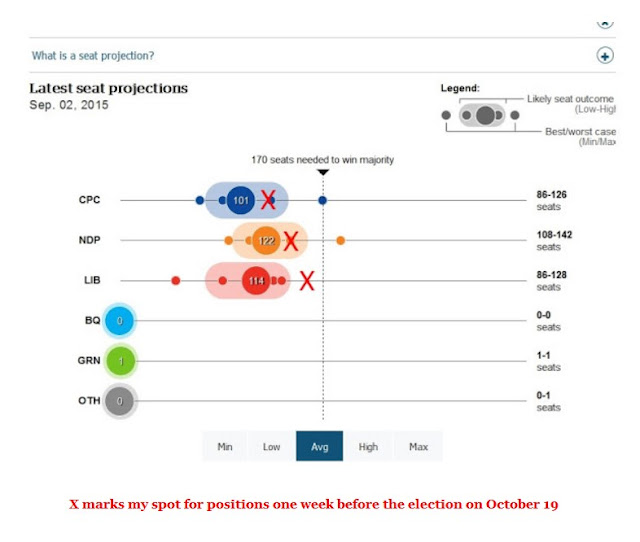My internet picks the worst times to stop working. As a result I was without internet for the lead up and aftermath ofelection 2015. But I’m back online and ready to give my thoughts on Monday’s election results. Fundy Royal Goes Liberal I never imagined I’d see the day when the
Continue readingTag: 2015 election
CuriosityCat: Election 2015: Fare thee well, Canada!
Fare thee well Goodbye, Mr. Sourpuss. Hello, Mr. Sunshine. Yesterday 68% of Canadian voters sent a message to politicians: Canada has had enough of sleazy Harperism. Now we have MPs elected from the Liberal Party, NDP and Green parties with the mandate to scrap the undemocratic First Past the Post
Continue readingCuriosityCat: Election 2015: Fare thee well, Canada!
CuriosityCat: Be a part of History & win your Bragging Rights by Voting on Monday
When you vote on Monday, you will earn Bragging Rights for your part in one of the most historical events in Canadian history. In years to come, you will be able to hold your head high and tell your friends, relatives, colleagues and strangers that YOU voted in the election
Continue readingCuriosityCat: Be a part of History & win your Bragging Rights by Voting on Monday
When you vote on Monday, you will earn Bragging Rights for your part in one of the most historical events in Canadian history. In years to come, you will be able to hold your head high and tell your friends, relatives, colleagues and strangers that YOU voted in the election that:
Trashy's World: My predictions for Monday…
… so you can all laugh at me on Tuesday… (0) Trashy, Ottawa, Ontario
Continue readingCuriosityCat: Vive la revolution: Why Liberal and NDP supporters will decide how to vote despite their leaders
 |
| The Great Canadian 2015 Revolution |
The Harper government has, during its four years of majority government, managed to persuade millions of Canadians that they have to vote in a different way in this election. Harper managed to grab power by cementing his conservative base, and using wedge politics to open the gap between the split opposition groups.
One fifth of past Conservatives now voting LiberalOne fifth of those who voted Conservative in 2011 will vote Liberal this time (18%), while one quarter of 2011 New Democrats will also vote Liberal (25%).One-in-six past Liberals will vote NDP (15%). This represents a shift from previous polls, where past Liberals voting NDP exceeded those voting the other way.Very few past Liberals or New Democrats will vote for the Conservatives this time.Core Conservatives most committed, switching Liberals and New Democrats less soClose to 8-in-10 Conservative voters say they are strong supporters of their party (78%), but this is only characteristic of about 6-in-10 Liberals (58%) or New Democrats (60%).This is because many of these voters come from each other’s parties.3-in-10 says vote could change before electionThree-in-ten voters have not yet made their choice final (29%) and these are much more likely to be Liberals (33%) and New Democrats (34%) than Conservatives (14%). This confirms the remaining core of Conservative voters is a very committed group, while Liberal and New Democratic voters are open to voting strategically.4-in-10 Liberals, New Democrats are voting strategicallyIn total, just more than a quarter of voters say they are voting for “the party that can defeat the government” (28%), rather than voting for “the party they believe in” (64%), but this increases to 4-in-10 among Liberals (39%) and New Democrats (41%).Liberals, Conservatives equally likely to be seen as victorsBoth the Liberals and the Conservatives are expected to win the election (35% each) while the NDP is no longer a contender (15%). While this tends to be a trailing measure, it may be an indication of potential growth in the Liberal vote.
CuriosityCat: Forum Poll: Why Stephen Harper has only 7 days left as prime minister
The Great Canadian 2015 Revolution The Harper government has, during its four years of majority government, managed to persuade millions of Canadians that they have to vote in a different way in this election. Harper managed to grab power by cementing his conservative base, and using wedge politics to open
Continue readingCuriosityCat: Election 2015: The Dramatic Tale of the Debates
Just a note for future elections: Debates count. A lot! Far more than most people realize. And the most recent poll by Signal / Toronto Star shows that even debates designed to avoid having millions of Canadians watch them, as our recent series were, count. Here’s a snapshot of voting
Continue readingCuriosityCat: Election 2015: The Dramatic Tale of the Debates
And the needle even moved in Tory Fortress Alberta – Justin moved ahead of Mulcair with the first debate, and kept increasing the gap:
CuriosityCat: Justin Trudeau the only leader with momentum
Here’s the chart from Angus Reid on the leadership momentum of the Big 3: This bodes well for the Liberals in this critical last week of the lengthy campaign. It you think of the trend then the pre-eminence of Justin Trudeau is even more striking. The desperate attempts of the
Continue readingCuriosityCat: Justin Trudeau the only leader with momentum
It you think of the trend then the pre-eminence of Justin Trudeau is even more striking. The desperate attempts of the Harper attack machine to paint him as just not ready have boomeranged badly, and he has clawed his way up from the lowly position he had some 6 months ago, to being Top Dog.
Then it will be Trudeau’s turn to see if he can gain the confidence of the House in his Liberal minority government.
The odds are that Mulcair will lead his NDP to support a minority Liberal government on a case by case confidence and other matters vote basis, until at least the archaic FPTP system of electing our MPs is replaced by a more democratic form, where every vote counts towards representation in the House.
CuriosityCat: Liberal Party ready to give Harper pink slip on October 19
The latest Poll Tracker seat projection 9CBC/308) show the LPC winning the most seats: You will note from my September 3 X-marks-the-spot projection that I overestimated the NDP seats when I projected more seats for the LPC on October 19: I would prefer that the NDP win more seats at
Continue readingCuriosityCat: Liberal Party ready to give Harper pink slip on October 19
CuriosityCat: Welcome move by Mulcair closer to Liberal position on cooperation and electoral reform
With the strong possibility of a minority Parliament resulting from the Oct. 19 vote, the NDP says in its platform document that it would work with other federalist parties through informal or appropriate stable arrangements to end Stephen Harper’s “lost decade.”
Included in their platform, called “Building the Canada of our Dreams,” is a plan to reform the political system and “make every vote count.” The NDP is promising that, if elected, it will introduce a system of voting based on mixed-member proportional representation. That would create a Parliament composed of MPs elected in larger ridings than currently exist, plus those nominated by parties based on the proportion of the vote they received during an election.
Although proportional representation has long been NDP policy, this is the first time the party has said it would create a task force made up of members of all parties that would decide the best model for this type of democracy – and that it would be done within the first mandate.
CuriosityCat: Welcome move by Mulcair closer to Liberal position on cooperation and electoral reform
Mulcair has shown a welcome willingness to work with a minority Liberal Party government post-October 19 so as to do two things: work together without the need for a formal coalition agreement between the LPC and NDP, and to establish a commission to examine the best alternatives to be presented
Continue readingCuriosityCat: The 16 Doomsday Ridings that can fire Harper as PM on October 19: Are you in one of them?
If you are, read this article and vote strategically. Here are 14 of the 16 Doomsday Ridings that can guarantee that Harper is given a pink slip on election day:And, here, to illustrate how it works, are the other 2 ridings:So who wins if the 16…
Continue readingCuriosityCat: The 16 Doomsday Ridings that can fire Harper as PM on October 19: Are you in one of them?
If you are, read this article and vote strategically. Here are 14 of the 16 Doomsday Ridings that can guarantee that Harper is given a pink slip on election day: And, here, to illustrate how it works, are the other 2 ridings: So who wins if the 16 Doomsday Ridings
Continue readingCuriosityCat: If this holds, Stephen Harper gets his pink slip on October 19
CuriosityCat: If this holds, Stephen Harper gets his pink slip on October 19
… and joins the ranks of unemployed prime ministers. Today (October 8) the CBC Poll Tracker shows the Liberal Party with the most seats for the very first time: Pause for a moment, all you progressives out there, and give three cheers! With only 11 days to go, the Red
Continue reading
